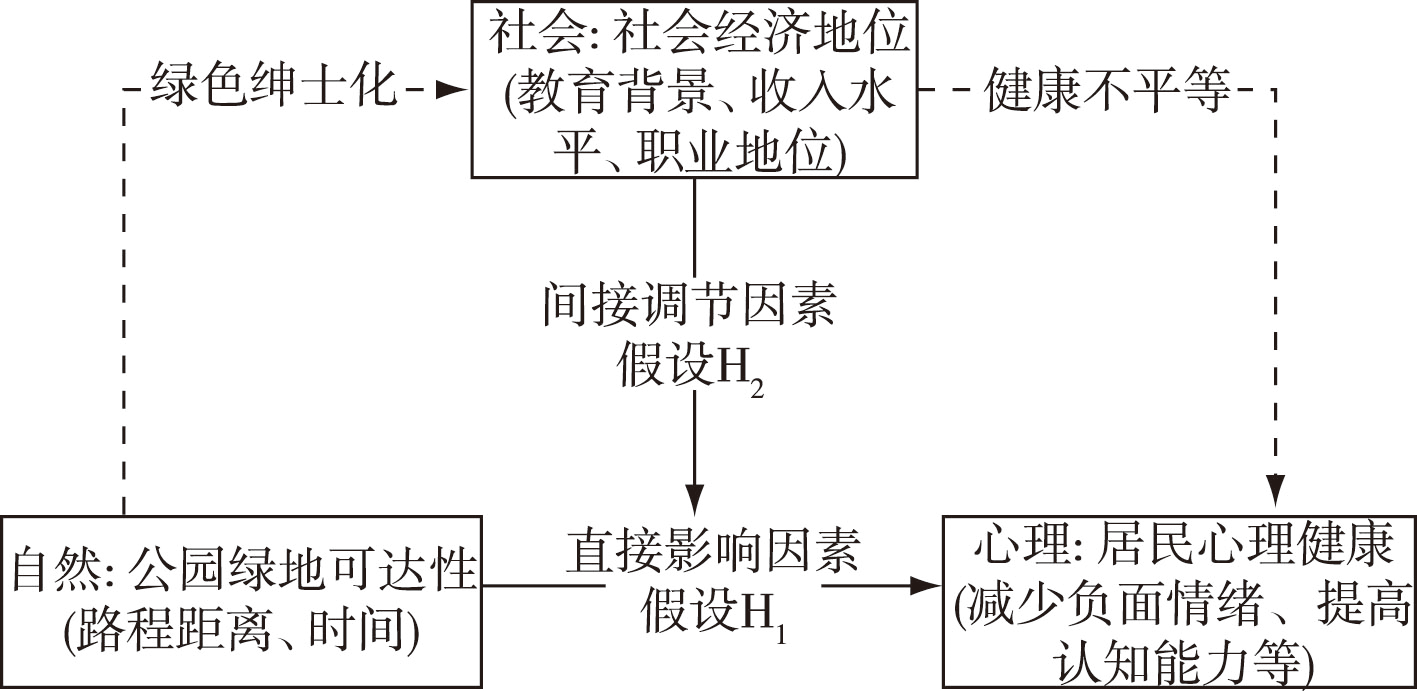 PDF(1534 KB)
PDF(1534 KB)


Associations between urban green space accessibility and mental health of residents from the perspective of socio-economic status
YANG He, MI Feng
Journal of Nanjing Forestry University (Natural Sciences Edition) ›› 2024, Vol. 48 ›› Issue (1) : 248-256.
 PDF(1534 KB)
PDF(1534 KB)
 PDF(1534 KB)
PDF(1534 KB)
Associations between urban green space accessibility and mental health of residents from the perspective of socio-economic status
【Objective】Environmental and social problems caused by rapid urbanization are increasingly threatening the health of residents, and the optimal allocation of urban park green spaces has become an essential strategy for the built environment of megacities to contribute to mental health positively. This study is to analyze the environmental and health benefits of urban green spaces from the perspective of accessibility, taking into account socio-economic conditions. 【Method】Based on the theoretical analysis of “nature-psychology-society”, an ordered logit and moderating effect model was constructed to explore the impact of urban park green spaces on mental health and to investigate the health inequalities resulting from the moderating effect of socio-economic status. 【Result】The baseline regression results show that improving the accessibility of urban park green spaces can positively influence mental health, and this positive effect tends to decay from the city center to its periphery. The moderating effect analysis revealed that socio-economic status had a positive moderating effect on the relationship between urban park accessibility and the mental health of residents, and significantly strengthened the positive effect of park accessibility on mental health. Heterogeneity analysis revealed that the mental health promotion effect of urban park accessibility was heterogeneous across household registration, gender, and age group and moderated by socioe-conomic status. Urban versus rural, female versus male, and elderly versus youth are more likely to suffer from mental health inequality risks induced by differences in park accessibility. 【Conclusion】To improve the mental health of all urban residents, three aspects should be adopted: optimizing green space layout planning, improving the quality of green space services, and strengthening the management system of green spaces.

urban park green spaces / accessibility / socioe-conomic status / resident mental health / environmental justice
| [1] |
陈阳, 张琳琳, 马仁锋, 等. 城市绿色空间可达性与居民分布的空间匹配与影响因素[J]. 生态学报, 2022, 42(24):9971-9980.
|
| [2] |
张丹婷, 陈崇贤, 洪波, 等. 城市绿地健康效益的群体差异及绿化投入影响研究[J]. 西北大学学报(自然科学版), 2019, 49(4):651-658.
|
| [3] |
董玉萍, 刘合林, 齐君. 城市绿地与居民健康关系研究进展[J]. 国际城市规划, 2020, 35(5):70-79.
|
| [4] |
王甫勤, 马瑜寅. 社会经济地位、社会资本与健康不平等[J]. 华中科技大学学报(社会科学版), 2020, 34(6):59-66.
|
| [5] |
|
| [6] |
辛昱铮, 陆伟, 孙佩锦. 基于公众心理健康视角的绿色空间研究与展望[J]. 风景园林, 2022, 29(3):79-85.
|
| [7] |
|
| [8] |
| [9] |
|
| [10] |
|
| [11] |
|
| [12] |
时珍, 邢露华, 郑琳琳, 等. 城市公园绿地游憩供需协同度评价及优化策略[J]. 南京林业大学学报(自然科学版), 2021, 45(2):197-204.
|
| [13] |
楚晗, 谢涤湘, 常江. 国外环境绅士化研究进展与启示[J]. 世界地理研究, 2023, 32(4):170-180.
|
| [14] |
史春云, 陶玉国. 城市绿地空间环境公平研究进展[J]. 世界地理研究, 2020, 29(3):621-630.
|
| [15] |
|
| [16] |
|
| [17] |
屠星月, 黄甘霖, 邬建国. 城市绿地可达性和居民福祉关系研究综述[J]. 生态学报, 2019, 39(2):421-431.
|
| [18] |
王志鹏, 王薇, 邢思懿. 城市公园绿地特征和使用方式与人群健康关系研究[J]. 南京林业大学学报(自然科学版), 2021, 45(5):223-231.
|
| [19] |
|
| [20] |
|
| [21] |
浩飞龙, 张浩然, 王士君. 基于多交通模式的长春市公园绿地空间可达性研究[J]. 地理科学, 2021, 41(4):695-704.
|
| [22] |
谢涤湘, 谢晓亮, 常江. 基于文献计量的公园绿地可达性分析[J]. 生态学报, 2021, 41(18):7475-7483.
|
| [23] |
|
| [24] |
国家统计局. 经济社会发展统计图表:第七次全国人口普查超大、特大城市人口基本情况[J]. 求是, 2021(18):79-79.
National Bureau of Statistics. Statistical tables and graphs on economic and social development: basic information on the population of megacities and mega-cities in the Seventh National Population Census[J]. Seeking Truth, 2021(18):79-79. http://www.qstheory.cn/dukan/qs/2021-09/16/c_1127863567.htm.
|
| [25] |
王宇. 智能手机使用对老年人主观健康的影响研究:基于2016年中国老年社会追踪调查(CLASS)数据[J]. 人口与发展, 2020, 26(6):65-75,112.
|
| [26] |
|
| [27] |
崔红志. 农村老年人主观幸福感影响因素分析:基于全国8省(区)农户问卷调查数据[J]. 中国农村经济, 2015(4):72-80.
|
| [28] |
王兰, 孙文尧, 吴莹. 主观感知的城市环境对居民健康的影响研究:基于全国60个县市的大样本调查[J]. 人文地理, 2020, 35(2):55-64.
|
| [29] |
范红丽, 杨嘉乐, 张晓慧. 社会文化组织对农村居民幸福感的影响:基于中国劳动力动态调查数据的分析[J]. 中国农村观察, 2022(4):170-184.
|
| [30] |
杜本峰, 穆跃瑄, 盛见. 老年人自评健康的预测因素、贡献程度及群体差异[J]. 中国卫生政策研究, 2022, 15(4):8-16.
|
| [31] |
杨俊, 鲍雅君, 金翠, 等. 大连城市绿地可达性对房价影响的差异性分析[J]. 地理科学, 2018, 38(12):1952-1960.
|
| [32] |
杨赫, 曾智, 陈天宇, 等. 居民需求视角下超大城市绿色空间的公平性研究——来自天津市1 655个微观样本的证据[J]. 城市问题, 2021(10): 36-45.
|
| [33] |
何安明, 万娇娇, 惠秋平. 手机依赖与青少年心理健康的关系:学业倦怠的中介作用和应对方式的调节作用[J]. 心理发展与教育, 2022, 38(3):391-398.
|
/
| 〈 |
|
〉 |